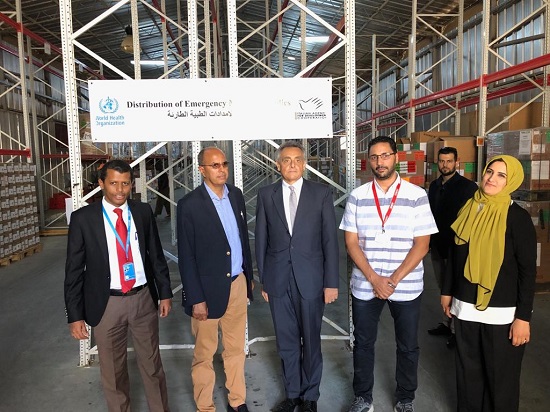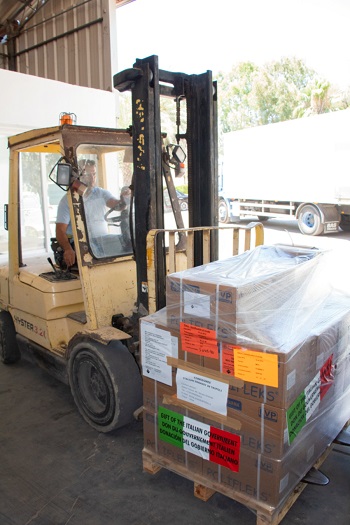 Italian ambassador Mr Giuseppe Buccino (centre) was present along with Ministry of Health directors as WHO launched a distribution of medical supplies to hospitals in and near Libya's capital
Italian ambassador Mr Giuseppe Buccino (centre) was present along with Ministry of Health directors as WHO launched a distribution of medical supplies to hospitals in and near Libya's capital
Tripoli, 6 July — As the armed conflict in Libya’s capital enters its fourth month, the World Health Organization has dispatched medicine and surgical supplies donated by the Government of Italy to treat the injured. WHO sent trauma kits, surgical instruments, and other supplies to 7 hospitals treating wounded people in and near Tripoli.
“It is critical to ensure that health facilities have what they need to treat the influx of wounded patients,” says Dr Hussein Y. Hassan, Emergency Team Leader for WHO Libya. “We don’t want lives to be lost because a crucial supply was out of stock.”
 Trauma kits donated by the Government of Italy include antibiotics and other essential medicines.
Trauma kits donated by the Government of Italy include antibiotics and other essential medicines.
Health facilities throughout Libya have run short of essential medical supplies because of the country’s ongoing instability. In collaboration with national and local health authorities, WHO regularly distributes medicines for infectious and noncommunicable diseases to hospitals and primary care centres across the country.
"At this critical humanitarian juncture, Italy is supporting the provision of surgical and trauma kits to hospitals and primary health care centres affected by the ongoing conflict,” said Italian Ambassador to Libya Mr Giuseppe Buccino. “Italy remains committed to ensuring continuous and timely assistance by partnering with the Libyan Government and the United Nations system, including WHO.”
WHO’s emergency medical teams provide specialized care in eastern Libya and the southern part of the country. WHO also trains Libyan health workers countrywide to monitor the trend of infectious diseases, plan vaccination campaigns, and prevent outbreaks.



